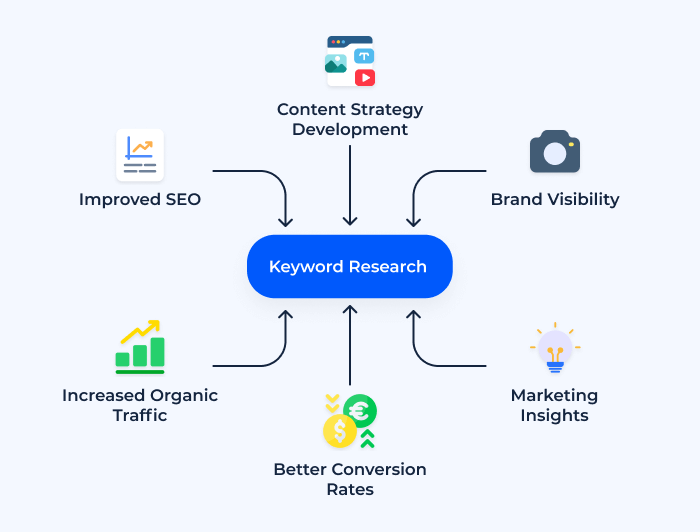In the fast-paced world of digital marketing and SEO, understanding the importance of keyword research can be the difference between a website that attracts organic traffic and one that remains invisible. Whether you’re running a small blog or managing a large e-commerce site, keyword research is an essential step to ensure your content ranks well on search engines and meets the needs of your audience. In this post, we’ll explore the benefits of keyword research, its role in SEO, and how it helps drive success in digital marketing campaigns.
What is Keyword Research?

Keyword research is the process of identifying the terms and phrases that people are typing into search engines when they look for information, products, or services related to your business. By understanding these search queries, you can tailor your content and SEO strategy to better align with what users are searching for. The goal is to optimize your website around these keywords to increase visibility and rank higher on search engine result pages (SERPs).
Effective keyword research provides insights into the topics that matter most to your target audience. It also helps in identifying content gaps, trends, and potential areas for improvement in your existing content. The best part? When executed correctly, it ensures that your content is discoverable to the right people, leading to more traffic, engagement, and conversions.
Tools Used For Keyword Research: Best 10 Tools | Don’t Miss The 9th Tool
Why is Keyword Research Important in Digital Marketing?
In the digital marketing landscape, keyword research is foundational to any strategy. Here’s why it’s so important:
- Boosts Organic Search Traffic: One of the most obvious benefits of keyword research is that it helps you rank higher in search engine results. By targeting the right keywords, you can ensure your content is found by users who are actively searching for your product, service, or information. Ranking higher increases your website’s visibility and drives more organic traffic to your site without the need for paid ads.
- Improves Content Relevance: Keyword research helps you understand the language your audience uses. By including relevant keywords in your content, you can create more targeted, valuable, and useful content that meets user intent. This not only makes your content more engaging but also helps search engines understand what your page is about, improving your chances of ranking.
- Enhances User Experience: When you create content based on thorough keyword research, you’re more likely to align with the needs and expectations of your audience. This leads to a better user experience, as people find what they’re looking for more quickly and easily. A positive user experience often results in longer on-site engagement, more conversions, and ultimately, better SEO performance.
- Informs Your Digital Marketing Strategy: Keyword research is not just valuable for SEO; it can also inform other areas of your digital marketing strategy. Understanding trending keywords can guide your social media campaigns, paid search efforts, and even product development. It helps you stay ahead of competitors and adapt to changes in user behavior.
The Role of Keyword Research in SEO
Keyword research is a fundamental aspect of any successful SEO strategy, offering numerous benefits that help businesses attract targeted traffic, improve online visibility, and stay competitive in their industry. Here’s how keyword research plays a crucial role in SEO:
1. Improves Search Engine Rankings: By targeting the right keywords, businesses can optimize their content to align with user search intent, which helps improve their rankings on search engine result pages (SERPs).
2. Long-Tail Keywords and Niche Targeting: Long-tail keywords allow businesses to focus on more specific, lower-competition phrases that attract highly targeted traffic. This approach is especially valuable for niche targeting and reaching an audience with specific needs.
3. Optimization of On-Page SEO: Keyword research guides the optimization of on-page SEO elements such as title tags, meta descriptions, headers, and content. This ensures that pages are well-structured and search engine-friendly.
4. Identifying Keyword Opportunities: By analyzing keyword data, businesses can discover new content ideas and opportunities that are likely to resonate with their audience. This can include blog topics, product descriptions, or landing page optimization.

5. Enhances Brand Visibility and Recall: When a business ranks for relevant, high-traffic keywords, it improves its visibility, making it easier for potential customers to discover the brand. This leads to stronger brand recognition and recall.
6. Increase in Direct Traffic: By targeting high-traffic keywords and optimizing content accordingly, businesses can attract more direct visitors to their website, which leads to increased traffic and better conversion opportunities.
7. Builds Brand Authority: Consistently ranking for authoritative keywords related to your industry establishes your brand as an expert, contributing to long-term brand authority and trustworthiness in your niche.
8. Identification of Key Competitors: Keyword research helps identify competitors who are ranking for similar terms. Understanding their strategies allows businesses to refine their own SEO tactics and stay competitive in the market.
How Keyword Research Drives Digital Marketing Campaigns
In digital marketing, keywords are a bridge between what users are searching for and the content you provide. Here’s how it impacts your overall strategy:
- Ad Campaign Optimization: In paid search advertising, such as Google Ads, keyword research is essential for choosing the right terms to bid on. By identifying high-performing keywords, you can optimize your budget and drive better results. Targeting the right keywords ensures your ads are shown to the right audience, maximizing the return on investment (ROI) of your ad spend.
- Content Strategy: Keyword research can help you determine what kind of content will resonate with your audience. By understanding which topics are most popular, you can create blog posts, videos, and infographics that target those topics. This not only increases engagement but also ensures you’re creating content that’s aligned with your audience’s needs.
- Competitor Analysis: Keyword research also involves understanding what keywords your competitors are ranking for. By analyzing their keyword strategy, you can identify gaps in their content and target areas where they might not be doing as well. This allows you to optimize your own content to outperform competitors in search rankings.
The importance of keyword research cannot be overstated in the world of SEO and digital marketing. It is essential for driving traffic, creating relevant content, and improving your overall search rankings. By understanding your audience’s search behavior and optimizing your content around the right keywords, you can improve your visibility and reach your marketing goals.
Whether you’re looking to boost your organic search rankings or run effective digital ad campaigns, keyword research serves as the foundation for success. Start integrating it into your digital marketing strategy today and watch your website thrive.
How Mohit’s SEO Training Can Help
At Mohit’s SEO Training, we offer a comprehensive, hands-on SEO course designed to make you job-ready. Instead of focusing solely on theory, we emphasize practical, real-world SEO applications. Alongside our Advanced SEO Training in Bangalore, we also specialize in Organic SEO Consulting. If you’re looking for a foolproof SEO strategy to elevate your business, reach out to us.
We provide a wide range of SEO services, including Local SEO, SaaS SEO, Ecommerce SEO, and International SEO, tailored to businesses in India and abroad. We’d be thrilled to partner with you and help your business succeed online.
Other Related Blogs
Keyword Cannibalization in SEO
Meaning of Keyword Difficulty Score
What is Good Keyword density?
Keyword proximity in SEO
Keyword stuffing in Digital Marketing
Tools used for keyword research
How to do the keyword research?
Keyword prominence in SEO
Importance of keyword research
FAQs
Why is keyword research important?
Keyword research helps you understand what your target audience is searching for and allows you to create content that aligns with their needs. It is crucial for improving SEO, driving organic traffic, and enhancing the relevance of your digital marketing efforts.
How do I conduct keyword research?
To conduct keyword research, use tools like Google Keyword Planner, SEMrush, or Ahrefs to find high-volume keywords related to your business. Analyze the competition and search volume of these terms and choose keywords that align with your content goals.
What is the difference between short-tail and long-tail keywords?
Short-tail keywords are broad terms that usually have higher search volume but also higher competition. Long-tail keywords are more specific phrases with lower competition and often higher conversion rates, as they target users with more defined search intent.
Can keyword research help with content marketing?
Absolutely! Keyword research helps inform your content strategy by identifying the topics your audience is interested in. Creating content around these topics ensures that it’s relevant and valuable to users, driving more engagement and improving SEO.
Mohit Verma
I am an experienced professional with 9+ years of experience in Search Engine Optimization. I am on a mission to provide industry focused job oriented SEO so the students/mentees can get their dream SEO job and and start working from day 1.
